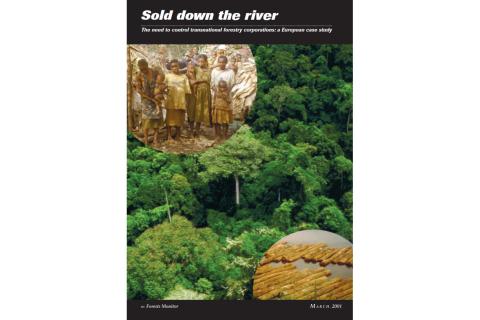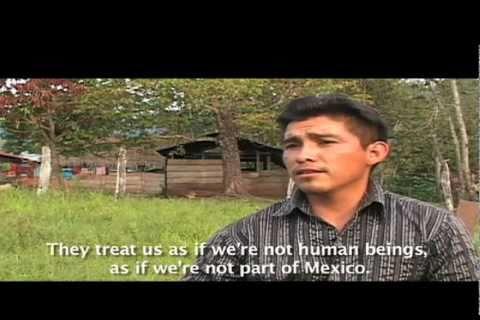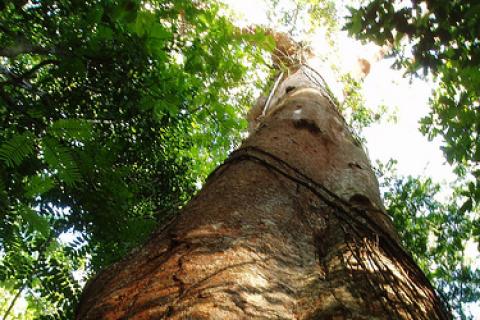By Forests Monitor, 2001
Sold Down the River - The Need to Control Transnational Forestry Corporations: A European Case Study
Other information
Sold Down the River - The Need to Control Transnational Forestry Corporations: A European Case Study
Short documentary video by Global Justice Ecology Project
In March, 2011, Global Justice Ecology Project traveled to the village of Amador Hernandez, within the Montes Azules Biosphere Reserve, deep in the Lacandon Jungle of Chiapas, Mexico, to investigate how climate policies such as REDD are impacting the local population. This is what they found...
In Buenos Aires, Argentina, on March 22-25, the International Committee for Food Sovereignty-Regional Coordinator for Latin America and the Caribbean (CIP-ALC) organized the Third Special Conference for Food Sovereignty, Rights and Life. The meeting was attended by representatives of social organizations in 20 countries.
Indonesia is a crucial country for REDD. It has one of the fastest rates of deforestation in the world. And, as a direct result of this deforestation (particularly the destruction of peatswamp forests) Indonesia is the world’s third highest emitter of carbon dioxide.
On January 31, 2011, the Indian movement POSCO Pratirodh Sangram Samiti (POSCO Resistance Struggle Movement) issued a press release to denounce Indian Environment Minister Jairam Ramesh’s decision to approve the POSCO India Steel-Power Production-Captive Port project (http://wrm.org.uy/countries/India/OK_POSCO_project.pdf).
Asia Pulp & Paper (APP) is a giant pulp and paper company with a notorious eco-criminal record. It is responsible of deforesting Indonesian forests and peatlands in Riau province, Sumatra, destroying the territory and livelihoods of indigenous communities who have been living there for centuries and threatening the survival of some of them as well as leading Sumatran tigers, elephants and orangutans to the verge of extinction.
By REDD Monitor
REDD, or reduced emissions from deforestation and forest degradation, is one of the most controversial issues in the climate change debate. The basic concept is simple: governments, companies or forest owners in the South should be rewarded for keeping their forests instead of cutting them down. The devil, as always, is in the details.
Video - In a remote corner of Brazil's Atlantic coast, they say time is a fiction. This ancient forest is seemingly unspoiled by modern life -- beyond the reach of men, machines, and markets. But a closer look reveals something very different happening here. Reported by Mark Schapiro, produced by Andres Cediel & co-produced by Daniela Broitman.
Watch the video here: http://www.pbs.org/frontlineworld/stories/carbonwatch/2010/05/the-carbon-hunters.html
Following FAO’s criterion for the limits of tree cover for "forest" (canopy cover between 10-30%), the Kyoto Protocol defines a forest as “a minimum area of land of 0.05-1.0 hectares with tree crown cover (or equivalent stocking level) of more than 10-30 per cent with trees with the potential to reach a minimum height of 2-5 metres at maturity in situ.”
Other UN organizations and initiatives as well as national governments follow this definition of forests in their negotiations, programmes and policies.
The Pacific watershed of Guatemala comprises 17 river basins. Most of the rivers in this region have a relatively short length of around 100 kilometres, from their source in the upper reaches of mountains and volcanoes to their mouths on the Pacific coast. One of these rivers is the Coyolate, which begins in the mountains of the department (state) of Chimaltenango and flows through numerous municipalities and communities.
West Africa used to be the centre of the palm oil industry. The export of palm kernels began in 1832 and by 1911 “British” West Africa alone exported 157,000 tonnes of which about 75 percent came from Nigeria. In the 1870s, British administrators took the plant to Malaysia and in 1934 that country surpassed Nigeria as the largest exporter of the product. By 1966, Malaysia and Indonesia had surpassed Africa’s total palm oil production.
As the neo-extractivist and development policies of the region’s governments continue to move forward, they come hand in hand with the destruction of the natural environment and the genocidal ethnocide of the indigenous peoples who inhabit it. The crossroads we are facing is more critical than ever: if the capitalist invasion is not stopped, the indigenous peoples and the rainforests will disappear.



